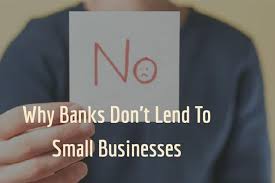
14 Jul Why Banks Say No to Business Startup Loans
Why Do Banks Say No to Startup Loans?
It is very difficult for a new business to get a loan from a commercial bank or lender for a business startup. New businesses are in fact the riskiest loans of any that a bank or lender might encounter. So understandably they are nervous about startup loans.
Why Business Startups are Risky
To understand why new business startups are risky for business lenders, take a look at the four C’s of Credit (collateral, capital, capacity, character).
Lenders expect the borrower to have:
- Capital – Business assets that can be used to create products or services and which can be turned into cash to make payments on business loans. A new business, especially a service business, has few business assets.
- Collateral – Cash to contribute to the business. A new business owner has little collateral unless he or she can use personal assets or has a co-signer with assets to pledge.
- Capacity – A track record to show that the business has the capacity to generate enough money to pay back the loan.
- Character. This is primarily a good credit rating. if you have a good credit rating (business credit or personal credit), though, it doesn’t mean you can get a business loan, but a poor rating will probably get you turned away quickly.
Other Reasons Banks Deny Startup Loans
Lack of experience. In professional businesses, it’s common for banks to deny a startup loan to someone who doesn’t have at least a year of experience working in the profession.
Lack of management. In a similar way to the owner having no experience, lenders may not be comfortable with a brand new business that doesn’t have a strong, experienced management team to add their help to make the business go.
Lack of customer base. Yes, it’s one of those “Catch-22” situations; you can’t get a loan unless you have customers, but you can’t start your business and get customers without the loan. If you can show that you have some strong customers lined up, that might make a good impression on the lender.
Banks are pretty creative when it comes to reasons for saying no to a startup loan. These are typical responses by banks to a young couple who were seeking a loan to start a professional practice.
Typical Bank Responses to Startup Loan Requests – And Your Response
Just Because.
Banks will often say simply, “We don’t give loans to startups.”
Your response: Move on to other banks. Sometimes it takes a while to find the right one.
100% Collateral.
One bank said it would give an $80,000 loan at 8% interest if the borrowers would have their co-signer put $80,000 in the bank (at 5% interest). When the borrower asked them why he shouldn’t just take the $80,000 to start his business, they responded, “This way you get business credit.”
Your response: You can’t get business credit unless you have a business. Move on, or consider other alternatives.
Limiting Loan Amounts. Another bank would only give them $50,000, saying that was the limit for “SBA express loans for startups.”
Your response: Before you talk to banks, talk to the SBA. Find out their criteria. Some banks are more willing to deal with the extra paperwork and hassle of SBA loans. You can go to the SBA and get tentative approval, to cut off the bank objections.
Equity from Owner. A bank I heard of said it wanted a “required equity injection” (that is, cash from the owner. If the bank loans $80,000 and requires $30,000 from the owner, the bank is really loaning only $50,000.
Your response: Be prepared by suggesting a co-signer (someone who will pledge to help you with the equity requirements.
Business Loans and Your Business Plan
One of the best ways to get a startup business loan is to craft your business plan carefully to answer all the questions a lender might ask and the objections that might be raised.
- Show how you plan to contribute capital to the business. What are you contributing to the business yourself? What do you already have (that’s paid for)?
- Show where your collateral will come from, and the credit records of you and any co-signer.
- Show the management expertise you, your advisors, and executives have to guide the business quickly to profitability.
- Include spreadsheets to show when your business will have a positive cash flow (not just profit) and that you are spending less than you bring in.
- Show your experience with similar businesses, or show you have an experienced management team behind you.
Personal Credit and Startup Loans
Because new businesses don’t have business credit of their own, the bank has to look at the credit of the people who own the business. Banks often deny startup loan requests because the personal credit of the borrower has problems. For example:
- The problem may be as little as one negative rating on your credit report, but that may be all it takes for a bank to say no.
- Low credit ratings also affect the ability to obtain startup funding. These days, any score under 800 is suspect, so you will need to know your credit rating and work to raise it.
Other Ways to Get Money for Business Startup
The best thing you can do if you are denied bank funding is to go to other sources of funding or alternative lenders. Here are some places to start:
SBA loan guarantees. The Small Business Administration (SBA) doesn’t directly loan money, but it gives guarantees to lenders, acting like a co-signer. Yes, there is more paperwork and time involved, but it may be worth it to get your startup loan. The SBA’s 7(a) loan program is a good place to start.
Friends and family. People you know are a possible source of some startup funds. A direct loan or an equity interest in the business (stock ownership) might be possible. If collateral is your problem, find someone who has some personal assets and who is willing to pledge them to help get the business started. You may also be able to find someone who will give the lender a personal guarantee.
Trade credit/Vendor financing. Getting financing from vendors is a way to reduce your need for a traditional loan. If you buy products, materials, inventory, or equipment from a vendor, ask them to give you longer terms or setting up credit accounts. It’s also a good way to build up your business credit rating.
Seller financing. If you are buying a business, you may be able to get the seller to guarantee part of the loan or give you an earn-out provision for all or part, in which you pay the seller back from your profits.
Credit card financing. As a last resort, you might consider credit card financing for your startup. This option is last resort because the interest rates are high and if your sales don’t take off quickly you could be in a deep financial hole.
Types of Lenders: Grand City Investment Limited is a licensed money lender.
There are many other types of lenders, including:
- Peer-to-peer (P2P) lenders
- Crowdfunding contributors
- Family and friends
- Yourself
P2P lenders can operate through online organizations, like LendingClub. These sites connect lenders with borrowers. P2P interest rates may be lower than borrowers would find with a traditional bank, but higher than a lender could receive from a certificate of deposit.
Crowdfunding sites like Kickstarter are similar to P2P lending sites, in that they digitally connect the people who need money with the people who have money. Unlike P2P lending, the people who contribute to crowdfunding efforts may not receive their money back dollar-for-dollar. Instead, they may receive perks from the person or project being funded. For example, someone may donate to a movie project’s Kickstarter, and in return, they’ll receive a copy of the movie once it’s completed.
Family and friends can become lenders, and these transactions are sometimes called “private party loans.” It’s important to consider the impact a loan might have on your personal relationship with these people. A loan agreement may help ensure everyone is on the same page.
If you have the means, you can loan your own money to your business, as an alternative to investing in it. If you choose to loan yourself money, write a contract that specifically spells out your role as a lender, the payment schedule, and the consequences for defaulting on payments.
In the USA for example, Small business owners might also consider contacting the Small Business Administration (SBA). The SBA works with lenders to provide guarantees for loans to small businesses. Their 7(a) loan program helps small businesses get loans who might not otherwise qualify because of “weaknesses” in their applications.
The SBA doesn’t act as a lender. Instead, a lender makes the loan and the SBA will guarantee the loan by agreeing to repay up to 85% of the loss in case of default. The SBA’s 7(a) Small Loan, for example, allows you to borrow up to $350,000 with up to 75% of that $350,000 guaranteed by the SBA.
However, the most common lenders are banks, credit unions, and other financial institutions such as Grand City Investment Limited that is a Licensed Money Lender that was incorporated in Hong Kong on MAY 29, 1984 with Company Registration No. 0137353 under the Money Lenders Ordinance (Chapter 163 of the laws of Hong Kong) to provide all types of loans, secured and unsecured loans, Recourse and Non Recourse Loans, Trade Finance, Insurance, Investments, Wealth Management, Portfolio Management, Trade Platforms, Private Placement Programs as well as the issuance and monetization of Bank Instruments such as Standby Letter of Credit (SBLC), Bank Guarantees (BG), Usance LC, Letters of Credit, Differed Letters of Credit and Funding for companies, SME’s and private individuals.
You can send us an email to learn more about our loan terms and conditions: apply@grandcityinvestment.com


No Comments